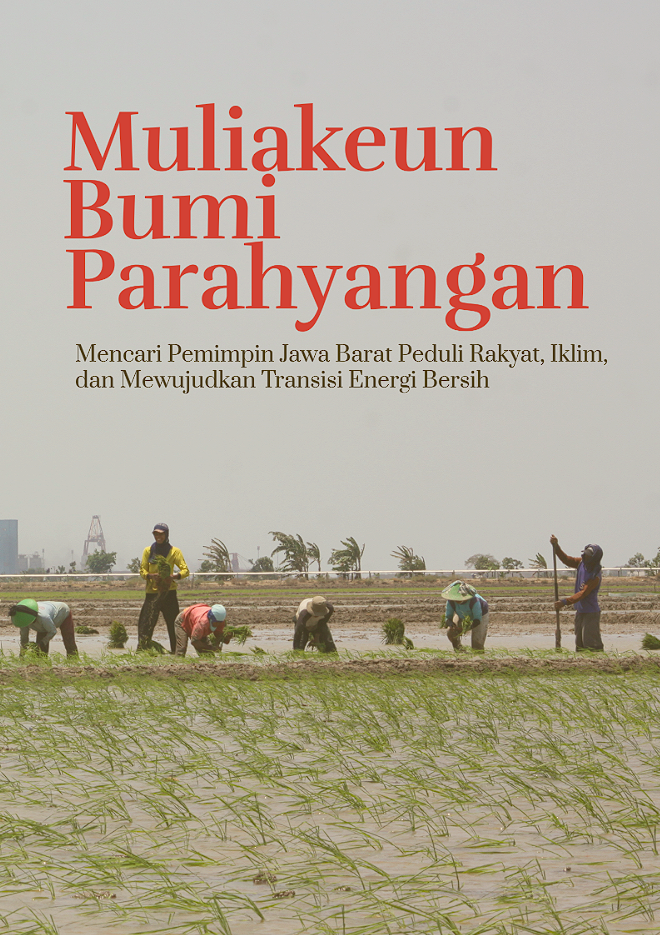By: Rahma Nur Aini
Climate justice is not just about reducing emissions, but also about who bears the burden and responsibility for the climate crisis. Specifically in Jakarta, young people are a vulnerable group to the climate crisis. In the future, they will inhabit the earth with declining environmental quality due to rising temperatures, extreme weather and degradation of natural resources.
For Generation Z, they have grown up with the awareness that the climate crisis is not just an environmental issue, but also a justice issue. This condition is reflected in the results of the survey Climate Rangers (CR) Jakarta which show that 74.8% of Generation Z had been exposed to the idea of climate justice. For Generation Z, the issue of climate justice is also not an abstract issue. Rather, they feel and experience for themselves the real impacts of the climate crisis. The same survey revealed that at least 99.5% of Generation Z stated that he had experienced extreme weather as an impact of the climate crisis. For example, young people on the coast of Jakarta lose time studying due to flooding and suffer health problems due to poor air quality.
In the future, young people will be the group most vulnerable to the negative impacts of the climate crisis. Intergovernmental Panel on Climate Change atau IPCC (2023) stated that if the climate crisis is not addressed, young people will be forced to live on an increasingly hot earth. In this way, the impact of the climate crisis will become more severe, with implications for reducing the quality of life. Moreover, currently climate policy at both the national and regional levels is not yet ambitious and fair, so it has the potential to have a more severe impact on young people. Therefore, we need to push for more ambitious and fair climate policies. One way to make this happen is by meaningfully involving young people in the development of climate policy.
Unfortunately, meaningful participation of young people in developing climate policy is still far from “ideal”. The CR Jakarta survey showed that as many as 62.4% of Generation Z considers the involvement of young people in the preparation of climate policy still tokenism. This means that young people have been involved in the process of formulating climate policies, but do not yet have significant influence and control in decision making. In addition, women’s involvement in climate policy formulation is also still low, with percentage 26.1% compared to men 33.5%. The low participation of women is due to unequal power relations between the government and society, so that the space for participation in decision making is still limited.
In fact, the involvement of Generation Z and women is not just a symbol of participation, but a strategic necessity in realizing ambitious and just climate policies. They bring new perspectives, creative approaches, and the courage to challenge the status quo. They are also closer to technology so they play an important role in formulating data-based solutions, transparency and digital participation (Kusumaningrum et al., 2023). In addition, young people, including young women, are a vulnerable group affected by climate policy. Therefore, it is important for the government to formulate climate policies that apply the principles of justice and involve young people meaningfully in their formulation.
IPCC (2022) highlighting three principles of climate justice, namely recognition justice, distributive justice and procedural justice. Recognition justice emphasizes recognizing people’s rights and needs. Then, distributive justice emphasizes the fair allocation of burdens and benefits. In addition, procedural justice ensures an inclusive and transparent space for participation.
Furthermore, Law No. 13 of 2022 explains in more detail regarding meaningful participation in the process of drafting laws and regulations. This law states that there are at least three prerequisites to fulfill the principle of meaningful participation, namely:
- Right to be heard
- Right to be considered
- Right to be explained
Even though they are only involved tokenistically, Generation Z is different from previous generations because they grew up with the climate crisis narrative. They are not only consumers of information, but also producers of movement. For example, the CR Jakarta survey revealed that at least 97.6% of Generation Z are interested in efforts to overcome the climate crisis and 82.1% of Generation Z are interested in being involved in climate action such as community service, campaigns, creative actions, and increasing public awareness. These findings show that Generation Z has a high desire to contribute to climate action. This can be seen from several actions carried out by CR Jakarta and young people in Jakarta (see Figures 1 and 2).
Additionally, for Generation Z, social media is not just a place to share opinions, but a new political space. Online petitions, infographic-based education, and creative satires on TikTok, Instagram and Twitter are part of the strategy to voice climate justice. Many of them are also starting to enter more strategic areas, such as participating in public forums, joining NGOs, and even formulating alternative community-based policies. This involvement is important, because without young people’s voices, climate policy often only benefits economic elites or simply embellishes green development reports.
Figure 1. Jakarta Emission Free March in 2024 | Figure 2. Creative Action at Car Free Day Jakarta in 2024 |
The CR Jakarta survey confirms that the idea of climate justice is starting to become known among Generation Z, because the climate crisis has had a detrimental impact on Generation Z, including reducing the quality of life. This increasingly severe impact is due to current climate policies that have not accommodated the needs and interests of Generation Z. The root of this problem lies in the limited participation space for young people in the formulation of climate policies. In fact, the majority of Generation Z are aware and want climate action that is fair to them. Therefore, The government needs to provide space for Generation Z participation in the formulation and implementation of climate policies.












